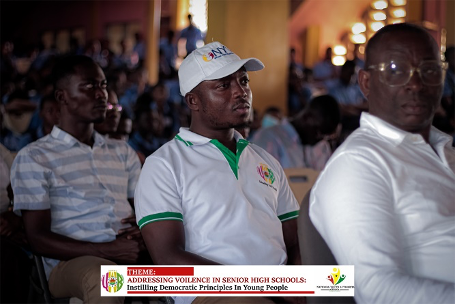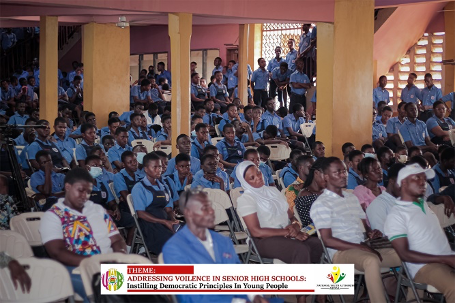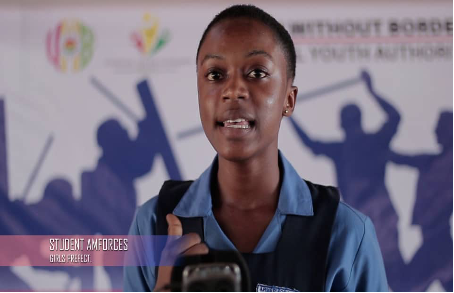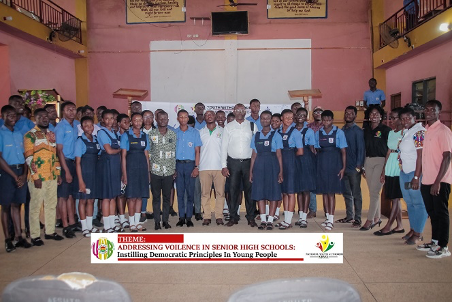Report of SHS Outreach on Violence in SHSs
Youth Without Borders Ghana and National Youth Authority Sensitize Kumasi Armed Forces SHTS onViolence in Senior High Schools under the theme: Addressing Violence in Senior High Schools; Instilling Democratic Principles in Young People.
Over the years, students have resorted to the use of violence and destruction of school properties in airing their grievances and making their voice heard in senior high schools. In recent times, there have been several reports of violent incidents, where students went on rampage to destroy school properties in protest against school authorities. A notable incident in Ashanti Region was where students of Islamic SHS blocked vehicular traffic in front of the school because vehicles were knocking down their colleagues. Even though some of the violent protests yielded the needed results, however, this does not represent the tenets of responsible and patriotic youth we seek for nation building.
It is in view of this that Youth Without Borders Ghana and National Youth Authority engaged the students of Armed Forces Senior High Technical School on proper grievance address system for young people. The activity began at 11:20am and closed at 1:00pm. The Assistant Headmistress (academics), head of IT department, some teachers and estimated 800 students were present. A team of 7 members of YWB and 2 NYA officers turned up for the event. The facilitator for the day was DSP Godwin Ahianyo, the Director of Public Affairs at the Regional Police Command in Ashanti Region.
Address by Mr. David Oteng Asamoah, Kumasi Metro Director of NYA
Opening the session, Mr. David Oteng Asamoah the Metro Director of NYA emphasized that the sensitization aimed at helping students to know how to channel their grievances for redress as students. He added that National Youth Authority has always sought various avenues to engaged SHSs on the prevailing violent tendencies occurring on their campuses. He expressed belief that this partnership with YWB Ghana and the Ghana Police Service will yield the results of curbing continuous violence and destruction of school properties.
Address by Ghana Police Service
Addressing the students, DSP Godwin Ahianyo, the public affairs director at the regional police command in Ashanti Region, elaborated on the long and short term consequences of violence in schools. He stated that violence manifest itself in several ways but notably are the physical and psychological violence. He said that violence could be inter or intra, where he further explained that violence could take place within the same school compound amongst students and or teachers, whiles it could also take place between different schools as a result of rivalry amongst other issues. Inter school sports competitions have also been the grounds for most inter school violence reported. Notable among the causes of violence on campuses was gang rivalry and notorious students wanting to display their rebellious powers.
He continued that violence in schools had very grim consequences on students and schools at large. He stated that students have been noted to vandalise school property and cause injuries to other students in the process of demonstrations. In the short term, this situations usually disrupt the school academic calendar, as sometimes school will have to break or go on recess to restore calm and also repair damaged properties. This disrupts the conducive and serene learning environments that students and teachers enjoy together.
According to the DSP, deviant behaviours in school have future consequences. He explained that with the current presence of social media and hidden CCTV cameras installed in public places, when one is captured causing harm or destroying public or private property, it easily captured and the information will be shared nationally and globally. This ultimately affects ones image as the videos and images could be retrieved at any time and used against you when you apply for a particular job or position in the near future.
Touching on the Public Order Act, he explained when a group wants to demonstrate or organize a public gathering, the leaders of the group must write to notify the Regional Police Command in the area for the demonstration within a minimum of five working days before the planned date of the demonstration stating the purpose, venue, time, route and destination of the demonstration. He emphasized that demonstrations rights of citizens, however proper administrative procedure cannot be ignored.
He also threw some light on the fact that violence is not only manifested during demonstrations and physical fights but also through bullying and intimidation. Making reference to the incident that happened in Adisadel College in Cape Coast, he told students that when the law catches up with you for taking matters into your own hands and bullying a colleague especially it degenerates into harming the person, the next thing is for the law to take its own course. There is no partiality or pardon for being convicted of a crime or breaking the law a student or ordinary person. Criminal background checks are a necessary requirement when vying for political positions and applying for travel documents, so being convicted of a crime at this stage in life means that you will have a criminal record that can hinder you in your career or travel since your fingerprints and data will be captured in the police system.
In his conclusion, the DSP stated that the human resource of our country’s future was the youth seated before him and therefore they needed to refrain from violence and other criminal behaviors. He advised students to be checks for one another to ensure discipline. Senior students were encouraged to mentor the younger ones and not bully them because they had experienced that. He reminded the student that their actions could put tags on their school which affects the image of the school. At this point he made students list certain schools in the region that had being tagged as violent due to the recurring instances of violence in the schools.
Address by Samuel Gariba: Executive Director, Youth Without Borders Ghana
Samuel Gariba, the Programme Officer and Executive Director of Youth Without Borders Ghana also stressed that, many times, students in SHSs do not realize that their public conduct has everything to do with the legal regime governing public order. He continued that over the years, students in high schools have indulged in violence without recourse to the ramifications on themselves and immediate environment and it is this same attitude that is transferred to tertiary institutions between one hall and the other. He admonished the students to be mindful of maintain school properties in the same good condition they met them so that their younger siblings can come and use them in the future.
Open Forum
In a questions and answer session that ensued, the following questions and answers followed.
Q1. Should demonstrations not be organized in schools and what happens if grievances are not addressed after authorities have been notified?
Ans. Demonstrations can be organized but they ought to be peaceful and the due process in the school and public order act should be followed. First school authorities should be engaged for resolution and if not resolved, a written notice to should be sent to the Police as stated in the public order act. The police will engage the relevant parties, they will not stop you but can advise on alternative means in resolving or addressing the issue. Failure to notify the police can lead to an arrest.
Q2. How do we stop “gangs” in the SHSs since they breed violence?
Ans. Report such groups to authorities for them to be disbanded. Formation of cultic and sexual (LGBTQIA+) groups in schools is prohibited and is punishable by law.
Q3. Is there any form of payment involved when you notify the police for demonstration?
Ans. No payment is required.
Q4. Will students receive same punishment for crimes as any other person?
Ans. Once you are convicted of a crime there are no special treatments for students. Punishments are meted out equally once you are arranged before a court. However, students or individuals below eighteen (18) years are kept in juvenile prisons or homes to serve their term of punishments when convicted.
Q5. When you accidentally kill someone who was trying to rape you, while you are young, will this restrict or hinder you from attaining a political position in the future?
Ans. Such an act is known as self-defense and this does not warrant a conviction. Once the act is proven in court to be a self-defense it does not go on record as murder. The students were encouraged to defend themselves with anything available when confronted with such situations and the law will defend them. They were also entreated to report such attempts to the police even if it came from their teachers or colleagues.”
Q6. How do you restore ones image after being wrongly convicted?
Ans. One can always request a police clearance or statement when required or necessary.
Feedback from Partners
Mad. Hannah, the head of IT department at the school, said the activity was very timely considering the prevalence of such violent demonstrations in SHSs especially in Ashanti Region. She added that it is important for the students to be wary of what they do on campus since CCTV cameras can capture them unawares and social media can easily make such violent behaviours a matter of public knowledge. They could easily be captured on cameras which can become a dent on their image.
The Girl’s Prefect said she learnt that, as a student, she should be mindful of she behaves on campus because violence can affect the way she learns. “… when I engage in any criminal activity, my education will be truncated”, she stressed.
A student also shared that, the event was unexpected, however, the police officer’s answer given to his question made him know that, regardless of being a student of not, punishment for criminal acts does not change. It only when the criminal is not up to 18 years old that the case will be tried in a juvenile court. That was very helpful.
Closing
At the end of the question and answer session the law enforcement officer led the students to pledge to be good and disciplined students abstaining from any form of violence. He also applauded the school authorities and students that in his over twenty-three years of being a law enforcement officer, they have not recorded any incident of violence from their school.
SAMPLED PHOTOS




MEDIA PUBLICATIONS